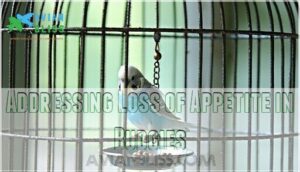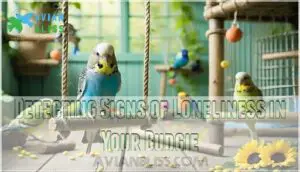This site is supported by our readers. We may earn a commission, at no cost to you, if you purchase through links.

You might notice extra naps, aggressive lunges, or your bird hiding in a corner, all whispering, “I miss the flock.”
Feather fluffing and a sudden loss of appetite are red flags too, hinting at emotional stress.
Budgies crave company—imagine if your favorite café closed for good, and you had no one to share coffee with.
Seeing these signs? You’re not alone, and there are gentle, expert-backed steps to help your feathered pal bounce back.
Table Of Contents
- Key Takeaways
- Signs of Loneliness in Budgies
- How to Identify Loneliness in Your Budgie
- Understanding Budgie’s Need for Companionship
- Addressing Loss of Appetite in Budgies
- Comforting a Lonely and Sad Budgie
- Detecting Signs of Loneliness in Your Budgie
- Alleviating Loneliness Without Another Budgie
- Frequently Asked Questions (FAQs)
- How can you tell if a budgie is lonely?
- How do you know if your budgie needs a friend?
- How do I know if my budgie is sad?
- How to comfort a lonely budgie?
- Can budgies become lonely even with other pets around?
- Do male and female budgies show loneliness differently?
- How long can budgies be left alone without consequences?
- Is there a genetic predisposition to loneliness in budgies?
- Can mirrors help reduce budgie loneliness?
- How long should budgies be alone daily?
- Conclusion
Key Takeaways
- Watch for behavioral changes – your budgie’s excessive chirping, feather picking, or sudden aggression are direct cries for companionship and social connection.
- Don’t ignore physical symptoms – when your bird starts sleeping excessively, loses appetite, or fluffs its feathers constantly, you’re seeing serious loneliness that needs immediate attention.
- You can help without getting another bird – increase daily interaction time, rotate toys weekly, play nature sounds, and allow supervised out-of-cage exploration to combat isolation.
- Act quickly to prevent depression – lonely budgies that withdraw, hide in corners, or stop vocalizing can develop severe health problems if you don’t address their social needs promptly.
Signs of Loneliness in Budgies
When your budgie starts showing unusual behaviors, it’s often crying out for companionship and social connection.
A budgie’s biggest cry is often a change in behavior, silently begging for your company and connection
These behavioral changes can signal that your feathered friend is struggling with loneliness and needs your attention.
Excessive Vocalization
When your budgie starts excessive vocalization – chirping, squawking, or screeching louder and more frequently than usual – they’re broadcasting their loneliness.
These Vocalization Patterns shift from melodious songs to persistent Loud Chirping designed to Call Attention.
Your feathered friend produces contact calls up to 50% more often when isolated, using Squawking Behavior as their SOS signal.
This Vocal Stimulation intensifies during dawn and dusk hours.
Feather Picking
Behind the cheerful feathers, feather picking signals your budgie’s loneliness or budding depression. You might notice bald spots, irritated skin, or a moody vibe—clear signs of loneliness and even self-mutilation.
Causes range from boredom to lack of stimulation. Prevention and treatment are essential: A potential cause could also be underlying nutritional deficiencies.
- Offer new toys and foraging fun.
- Boost daily social time.
- Rule out illness promptly to address potential underlying issues.
Lethargy
When your budgie starts sleeping away the day, it’s time to pay attention.
Lethargy in lonely budgies manifests as excessive sleeping, prolonged inactivity, and withdrawal from normal behaviors.
These depression signs include reduced playfulness and reluctance to engage with toys or surroundings.
Fatigue factors from budgie loneliness create noticeable budgie behavior changes – your once-active bird becomes a quiet shadow of itself, highlighting critical inactivity effects on their wellbeing.
Aggressive Behavior
When your feathered companion turns into a tiny terror, aggressive behavior signals deep loneliness.
This cry for attention manifests through:
- Biting Issues – Nipping at fingers during interactions
- Feather Attacks – Lunging at perceived threats aggressively
- Territorial Defense – Guarding cage space from intrusion
- Aggressive Posture – Puffed feathers with threatening stance
Such budgie aggression isn’t malice—it’s desperation for social connection.
Excessive Sleeping
When you notice your budgie constantly hitting the hay, it’s often a red flag for loneliness.
Healthy budgies maintain predictable Sleep Patterns with distinct Rest Modes throughout the day.
| Sleep Behavior | Normal | Concerning |
|---|---|---|
| Daytime Napping | Brief 10-15 min rests | Hours-long sleeping sessions |
| Nighttime Behavior | 10-12 hours solid sleep | Restless or excessive sleep |
| Activity Level | Alert between naps | Lethargic, low energy |
| Response to Stimuli | Quick to wake up | Slow to respond |
| Overall Fatigue Levels** | Energetic when awake | Perpetually tired |
Excessive sleeping beyond normal patterns signals your lonely budgie needs attention. Unlike their naturally active disposition, isolated birds often retreat into sleep as an escape mechanism.
This budgie loneliness manifests through disrupted circadian rhythms and prolonged rest periods.
Monitor your budgie behavior closely—healthy birds shouldn’t sleep during peak activity hours. These signs of lonely budgie require immediate intervention to prevent depression from worsening.
How to Identify Loneliness in Your Budgie
Identifying lonely budgie behavior requires careful observation of subtle changes in your feathered companion. Budgie behavior shifts dramatically when social isolation occurs, making early detection essential for their wellbeing.
Watch for these lonely symptoms and stress signs:
- Silent treatment: Your normally chatty budgie stops singing or chirping entirely
- Feather destruction: Excessive plucking or over-preening from boredom and anxiety
- Food strike: Loss of appetite leading to concerning weight loss
- Corner dwelling: Hiding in cage corners, avoiding toys and social areas
- Mood swings: Increased aggression alternating with complete withdrawal
Budgie emotions run deeper than many realize. These bird loneliness symptoms often mirror budgie depression signs – your pet’s personality dulls, their vibrant energy fades, and they become a shadow of their former selves. Trust your instincts when something feels off.
Understanding Budgie’s Need for Companionship
You’ll notice your budgie thrives on interaction just like their wild counterparts who live in massive flocks of hundreds.
Without proper social connections, these naturally gregarious birds quickly develop behavioral issues that mirror human loneliness symptoms, which can be alleviated by providing interaction.
Social Stimulation
Your budgie’s social needs run deeper than you might think. These naturally social birds thrive on constant interaction and mental engagement in the wild.
Without proper social stimulation, your feathered friend can quickly develop problematic behaviors. Social bonding through human interaction or bird companions provides essential emotional support.
Environmental enrichment with interactive toys helps satisfy their need for engagement when you’re away.
| Social Need | Daily Requirement |
|---|---|
| Human interaction | 2-4 hours |
| Environmental changes | Weekly toy rotation |
| Vocal stimulation | Continuous background sounds |
| Physical activity | 1-2 hours outside cage |
| Mental challenges | New puzzles/games |
Understanding the importance of social bird companions is essential for providing the right environment.
Bird socialization isn’t optional—it’s imperative for preventing loneliness-related issues like feather plucking and aggression.
Mimicking Behavior
Mimicking behavior in budgies reveals their desperate need for social connection. These clever birds use vocal imitation and behavioral cloning as survival tools, copying sounds and movements from their environment when companions aren’t available.
Watch your budgie mimic everything around them—it’s their heartfelt way of saying, “I need a friend right now.”
Watch for these telling signs your budgie craves interaction:
- Excessive mimicry – Your bird starts copying every household sound, from phone rings to microwave beeps
- Mirror conversations – They’ll chat endlessly with their reflection, treating it like a real companion
- Human sound repetition – Constantly repeating your words or whistles, even when you’re not around
Social learning drives this behavior. In the wild, budgies develop mimicry skills through flock interaction, learning essential bird communication patterns. Your solo budgie’s vocalization attempts aren’t just cute – they’re urgent calls for the social stimulation they’re missing.
Emotional Support
Three core truths about emotional support reveal your budgie’s deepest needs.
When experiencing lonely budgie symptoms, they desperately seek companion care and emotional bonding.
Your presence becomes their lifeline for stress management.
Without proper social needs fulfillment, parakeet separation anxiety intensifies.
Think of yourself as their therapist – behavioral therapy through consistent bird companionship creates the foundation they crave for emotional stability.
Addressing Loss of Appetite in Budgies
When your budgie stops eating regularly, you’re witnessing one of the most serious warning signs of loneliness that demands immediate attention.
This appetite loss can quickly escalate to malnutrition and weakened immunity, making early intervention essential for your bird’s survival.
Feather Fluffing
Your budgie’s feather fluffing often signals emotional distress beyond normal plume maintenance.
When lonely budgies consistently fluff their feathers, they’re attempting self-soothing while experiencing stress-related metabolic changes. This avian hygiene behavior differs from typical bird grooming – it’s prolonged and accompanied by decreased activity.
Unlike natural flock behavior, isolated budgies use fluffing as a coping mechanism. Watch for persistent fluffing patterns, as they may precede feather picking or other budgie loneliness signs.
Recognizing parrot health issues is vital to address the underlying causes of feather fluffing and appetite loss in budgies.
Attention-Seeking Behavior
Exaggerated actions and constant demands are your budgie’s way of waving a bright flag for help.
Loud noises, excessive vocalization, mimicking sounds, and even destructive behavior can all point to attention-seeking.
If you notice these budgie behavior changes, consider them classic budgie loneliness signs.
A lonely budgie’s antics are often their loudest cry for connection.
Self-Isolation
Several telltale signs reveal when your feathered friend withdraws into their own world.
Cage Bound behavior emerges as your budgie retreats to isolated corners, avoiding their usual perches.
Social Withdrawal becomes evident through diminished interaction with toys or mirrors they once enjoyed.
This Solitary Life manifests as self-isolation alongside concerning symptoms like feather picking and reduced appetite.
Watch for these Isolation Signs: minimal movement, fluffed postures, and silence replacing their typical chatter.
Unlike excessive vocalization that screams for attention, this Lonely Behavior whispers distress through withdrawal.
Recognizing budgie loneliness signs early prevents serious health complications from developing in your companion’s emotional state, which can be characterized by minimal movement and fluffed postures, indicating a need for intervention to address the Lonely Behavior and prevent further distress.
Comforting a Lonely and Sad Budgie
When your budgie shows signs of loneliness, quick action can prevent serious health problems like depression and self-harm.
The good news is that with the right approach, you can help your feathered friend feel connected and content again.
Provide Companionship
Your budgie’s loneliness calls for immediate companion introduction. While cage mates offer ideal budgie companionship, increased human interaction works wonders too.
Spend quality time talking, whistling, and playing together. This social bonding addresses parrot social isolation effectively.
Environmental enrichment through your presence helps combat that lonely budgie behavior. Remember: consistent daily engagement builds trust and reduces those budgie social interaction deficits substantially.
Providing suitable Budgie Companion toys can also help alleviate loneliness in budgies.
Increase Social Interaction
When someone can’t get another budgie, increasing your lonely budgie’s human connection becomes essential for their wellbeing.
Focus on quality interactive time that builds social bonding through meaningful engagement.
- Daily conversation sessions: Talk to your budgie throughout the day, mimicking their natural flock communication patterns
- Hands-on playtime activities: Engage in gentle games that encourage physical interaction and trust-building
- Training sessions: Teach simple tricks or commands to stimulate their mind while strengthening your bond
- Mirror placement: Position interactive toys strategically to create the illusion of cage mates during solo time
Budgie companionship doesn’t always require another bird—consistent human connection can substantially improve bird socialization and reduce loneliness-related behaviors.
Enrich The Environment
Environmental enrichment transforms your budgie’s cage from boring to brilliant.
Strategic toys rotation and cage upgrades create constant discovery opportunities.
Mix textures, heights, and hiding spots for natural behaviors.
| Enrichment Type | Examples | Benefits |
|---|---|---|
| Foraging Activities | Hidden treats, puzzle feeders, scatter feeding | Mimics natural behavior, reduces boredom |
| Climbing Structures | Natural branches, rope perches, ladders | Encourages exercise, prevents lethargy |
| Sensory Stimulation | Colorful toys, safe herbs, textured perches | Reduces stress, promotes exploration |
| Interactive Elements | Bells, mirrors, shredding materials | Prevents destructive behaviors, mental engagement |
| Environmental Changes | Weekly toy rotation, perch repositioning | Maintains curiosity, prevents monotony |
Weekly environmental changes keep your feathered friend mentally sharp.
Swap perch locations, introduce new climbing routes, and rotate chewable items regularly.
This stimulating environment prevents the repetitive behaviors that lonely budgies develop.
Providing bird enrichment activities is essential for their well-being and mental health.
Play Nature Sounds
Beyond enriching your budgie’s physical space, sound therapy can work wonders for bird loneliness signs.
Nature recordings create auditory stimulation that mimics your lonely budgie’s natural habitat, reducing stress and providing comfort when you’re away.
- Calming music with gentle melodies
- Bird sounds featuring soft chirping and tweets
- Rainforest ambiance with water sounds
- Wind through trees for peaceful atmosphere
This audio stimulation helps lonely budgies feel less isolated by creating a soothing soundscape that resembles their wild environment, making them more relaxed and content.
Offer a Balanced Diet
When your budgie’s feeling lonely, nutrient needs become even more vital for lifting their spirits.
A balanced diet with fresh fruits, varied vegetables, and quality pellet options creates the foundation for better budgie health.
Think of food variety as emotional medicine—colorful bell peppers, leafy spinach, and sweet apple slices transform mealtime into mental stimulation.
| Food Category | Mood-Boosting Options |
|---|---|
| Fresh Fruits | Apples, berries, grapes |
| Vegetables | Bell peppers, broccoli, carrots |
| Quality Pellets | Fortified, colored varieties |
| Seeds (Limited) | Millet sprays, sunflower seeds |
| Treats | Sprouted seeds, herbs |
This nutritious diet supports bird nutrition while combating loneliness-induced appetite loss.
Consider dietary supplements only when recommended by an avian veterinarian for the best budgie diet success.
Detecting Signs of Loneliness in Your Budgie
Vigilance becomes your greatest tool when Budgie Behavior shifts from normal patterns. Your feathered companion communicates distress through specific Emotional Signs that require careful observation.
Watch for these critical signs of loneliness that indicate Social Isolation:
- Excessive vocalization – constant chirping or screeching that’s louder than usual
- Feather picking – plucking or over-preening that creates bald patches
- Lethargy and increased sleeping beyond normal 12-hour cycles
- Sudden aggression or biting when previously friendly
- Complete silence after being typically chatty
Loneliness Causes often stem from environmental changes or lack of stimulation. Your lonely budgie might display Stress Factors like pacing, wing-shaking, or hiding in corners. These behaviors signal emotional distress that shouldn’t be ignored.
Pay attention to appetite changes and posture shifts – fluffed feathers combined with stationary positioning often indicates depression. Budgie loneliness manifests differently in each bird, so document behavioral changes over several days to identify patterns and determine appropriate interventions. Recognizing respiratory issues is essential in understanding the overall health and well-being of your budgie.
Alleviating Loneliness Without Another Budgie
You don’t need to get another budgie to help your lonely feathered friend feel better.
Simple changes to your daily routine and your budgie’s environment can make a significant difference in their emotional well-being.
Spend Quality Time
Quality time transforms your budgie’s world through Daily Interaction and purposeful Owner Engagement. Creating meaningful Social Bonding experiences addresses your bird’s budgie companionship needs directly. Your consistent presence becomes their anchor against social bird loneliness.
Focus on these Playtime Activities for effective budgie socialization:
- Gentle Handling sessions with soft head scratches
- Whistle conversations that encourage vocal responses
- Shared snack time with budgie-safe treats
- Reading aloud sessions using varied vocal tones
- Teaching simple tricks through positive reinforcement
This budgie interaction approach builds trust while satisfying their quality time requirements naturally. Understanding the role of head bobbing behavior can also provide valuable insights into your budgie’s emotional state and social needs.
Provide Toys and Enrichment
Enrichment transforms a lonely budgie’s world from boring to brilliant.
Toy rotation keeps things fresh—swap out playthings weekly to maintain curiosity.
Offer foraging toys that hide treats, encouraging natural social stimulation.
Sensory play items like bells and colorful textures boost engagement.
Mix chewable toys, bird toys, and climbing structures for complete environmental enrichment that reduces boredom.
Providing a variety of budgie toys can help create a stimulating environment for your pet.
Allow Out-of-Cage Time
Beyond toys, your budgie craves Flight Therapy – the ultimate cure for cabin fever. Outofcage time transforms lonely birds into happy explorers, addressing budgie social needs through movement and discovery.
Cage Free Time benefits include:
- Wing Exercise strengthens muscles and improves circulation
- Social Freedom allows natural behaviors and environmental exploration
- Enhanced budgie interaction tips through supervised play sessions
Create safe Outdoor Play zones by removing hazards, closing windows, and supervising adventures. This socialization opportunity combats isolation while meeting essential budgie exercise requirements for mental stimulation.
Play Budgie Sounds
Audio stimulation offers powerful relief for lonely budgeies experiencing excessive vocalization or withdrawal.
Playing calming music mixed with gentle bird sounds creates vocal comfort that mimics natural flock environments.
Consider these sound therapy options:
- Soft budgie vocalizations – gentle chirping recordings
- Nature soundscapes – rustling leaves, flowing water
- Classical music – proven to reduce stress in birds
- Ambient bird sounds – creates community feeling
Keep volume low and observe your budgie’s response to different audio stimulation types.
Offer Variety of Foods
Transforming mealtime into an adventure helps combat loneliness while supporting your budgie’s health.
Fresh fruits like apple slices provide natural sweetness, while nutrient rich vegetables deliver essential vitamins.
A balanced diet combining seed variety with high-quality pellet options creates excitement and proper nutrition for your feathered companion.
| Food Category | Benefits |
|---|---|
| Fresh Fruits | Natural vitamins, mental stimulation |
| Leafy Vegetables | Fiber, essential nutrients |
| Seed Variety | Protein, healthy fats, foraging fun |
| Quality Pellets | Complete nutrition, consistent health |
| Healthy Treats | Bonding opportunities, enrichment |
Frequently Asked Questions (FAQs)
How can you tell if a budgie is lonely?
When your budgie goes from chirpy chatterbox to silence, or plucks feathers instead of playing, loneliness may be at play.
Watch for tiredness, hiding, extra screeching, and less appetite—your feathered friend’s way of calling for company.
How do you know if your budgie needs a friend?
If your bird stops singing, seems moody, plucks feathers, or spends hours glued to one spot, it’s likely craving a buddy.
Like us, they need company—sometimes a feathery roommate is just what the doctor ordered.
How do I know if my budgie is sad?
Ever wonder if your little pal’s feeling blue?
Watch for less singing, hiding, feather plucking, or a dropped appetite.
If your cheerful companion turns quiet or irritable, it’s time for extra attention and maybe a new toy.
How to comfort a lonely budgie?
Spend time talking, singing, or gently whistling to your feathered friend.
Add new toys or move the cage near family activity.
Offer treats, create a routine, and even play soft music—companionship works wonders for lonely souls.
Can budgies become lonely even with other pets around?
Yes, budgies can feel lonely even with other pets around. They’re highly social birds that need interaction with their own species or dedicated human companionship to thrive emotionally and mentally.
Do male and female budgies show loneliness differently?
Male and female budgies don’t show dramatically different loneliness signs, but females often become quieter and more withdrawn while males typically increase their calling and pacing behaviors when isolated.
How long can budgies be left alone without consequences?
Budgies shouldn’t be left alone for more than 8-10 hours daily.
Beyond this timeframe, you’ll notice stress behaviors like excessive chirping, feather plucking, and depression developing within days of prolonged isolation.
Is there a genetic predisposition to loneliness in budgies?
Looking deeper into budgie genetics reveals no evidence for inherited loneliness tendencies.
Environmental factors drive social distress instead.
You’ll find individual personality traits vary, but social isolation triggers universal behavioral responses regardless of lineage.
Can mirrors help reduce budgie loneliness?
Mirrors can temporarily distract your budgie, but they won’t truly solve loneliness.
You’ll create a false sense of companionship that may lead to obsessive behaviors and frustration when the "friend" doesn’t respond naturally.
How long should budgies be alone daily?
You don’t want to leave your feathered friend alone for more than 4–6 hours a day.
Anything longer, and you risk boredom, stress, or even sulking fits.
Try to keep your parakeet’s world lively and social.
Conclusion
Ironically, the very signs that make your budgie appear difficult—excessive chatter, feather picking, or territorial behavior—are actually desperate pleas for connection.
Recognizing these signs of a lonely budgie isn’t about judgment; it’s about understanding your bird’s emotional needs.
Whether you provide a feathered companion or increase your daily interactions, addressing loneliness transforms behavioral problems into opportunities for deeper bonding with your pet.
- https://pmc.ncbi.nlm.nih.gov/articles/PMC8279392/
- https://freerangeparrots.org/2020/09/15/unintentional-enrichment-and-feather-plucking/
- https://www.omlet.us/guide/parakeets/health_problems/feather_problems/
- https://www.vetmed.ucdavis.edu/sites/g/files/dgvnsk491/files/inline-files/Feather-picking_in_Birds.pdf
- https://www.sciencedirect.com/science/article/abs/pii/S0168159102001922









